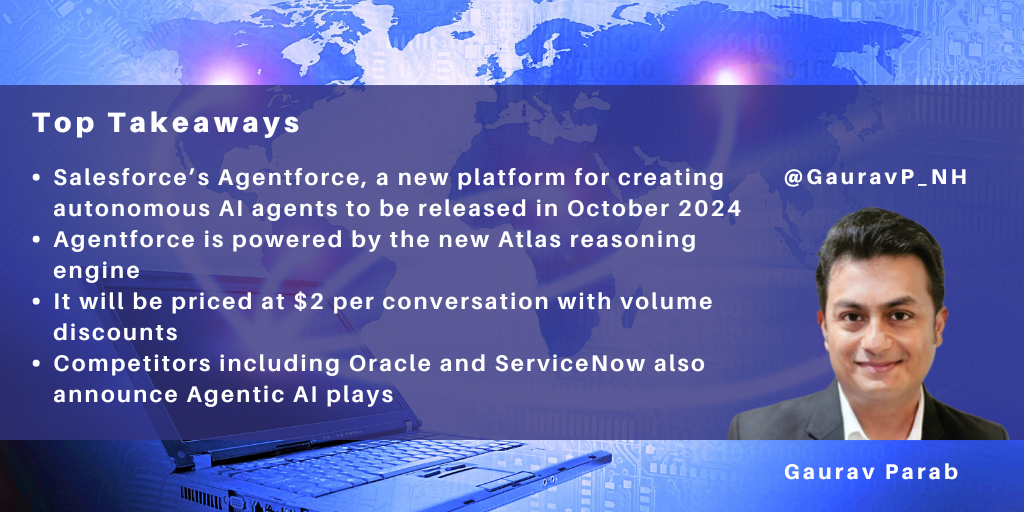posted on Sep 30, 2024 by Gaurav Parab

NelsonHall recently attended Dreamforce, the annual Salesforce flagship event in San Francisco. Billed as the largest AI conference in the world, Dreamforce 2024 saw a marketing push like none other, even by Salesforce’s standards, towards Agentforce, its new platform for creating autonomous AI agents capable of analyzing data, making decisions, and taking action. Agents built on the Agentforce platform can, for example, be deployed to answer customer service inquiries, qualify sales leads, and optimize marketing campaigns.
From the keynote, speaking sessions, and our conversations with Salesforce experts, it was evident that Salesforce’s future is now spelled completely as Agentforce. So much so that the rare moments when Agentforce was not mentioned were when Mark Benioff took swipes at competitors and what he calls the DIY culture, where enterprises try to do AI on their own.
What is Agentforce and why Salesforce claims it is different
The difference between Agentforce agents and AI copilots, according to Salesforce, is the ability to go beyond generating content to act autonomously without the need for human supervision. For example, when most of today’s virtual assistants get a query, they scrounge through a data set and throw up a response in the form of a link or a next step to do. But an agent, according to Salesforce, will initiate a purchase instead of merely suggesting the ways to make a purchase.
This capability is enabled by Salesforce agents from Agentforce and custom-made agents that enterprises will be able to put together using the Agent Builder, a low-code tool available in the upcoming Agentforce October release. These agents are powered by the new Atlas reasoning engine, which, according to Salesforce, improves itself based on the outcomes from previous interactions and not necessarily human feedback. Salesforce pitches itself as having a unique advantage over open-source models, claiming a comprehensive customer view from its multiple clouds, and better data quality orchestrated through its Data cloud. This, according to Salesforce, results in fewer hallucinations.
Salesforce service providers respond
NelsonHall spoke with more than 15 service partners at the event. The general tone was one of guarded optimism. Most agree with the perception that Salesforce had catching up to do in the AI race but that now, true to style, Salesforce has pitched itself right into the centre of the AI world. Clients are impressed with early Agentforce examples like OpenTable, Wiley, Bombardier, Wyndham and Saks Avenue, where agents are used to offer customized service to a customer, suggesting and executing a purchase and any subsequent return or re-delivery without human intervention. The initial hesitancy expressed by clients is to be expected for a release of this scale and significance, given that clients continue to grapple with the perennial issue of tech debt and messy subscriptions to SaaS platforms. However, what Benioff and his execs did well was build a compelling case for Agentforce and showcase possibilities across industries which will play out positively as adoption grows in a few months from now.
Vendors are keen to get their hands on the upcoming release while awaiting an improved understanding of the commercial promise of $2 per transaction. The next six to twelve months will see a flurry of building agents across horizontals and industries. Initial adoption is likely to be faster in industries like retail that deal with seasonal surges, and for use cases involving personalized customer service.
The agent lined road ahead
Salesforce states that Agentforce represents the third wave of AI, the first being the predictive wave back in 2016 with Einstein, and the second wave involving co-pilots. The fact that Salesforce claims to have rearchitected the entire Salesforce product portfolio, including applications like Tableau and Slack, is a strong indicator of intent and future direction.
Salesforce is not alone in the agent gold rush, even if it sits atop by the sheer scale of its ambition. Oracle has spoken about having ~50 agents inside its Fusion applications by next year, and ServiceNow before Dreamforce announced use cases for agents across ITSM and customer service. With others also moving in this direction, Agentic AI is set to become more mainstream and build on the success of GenAI.
